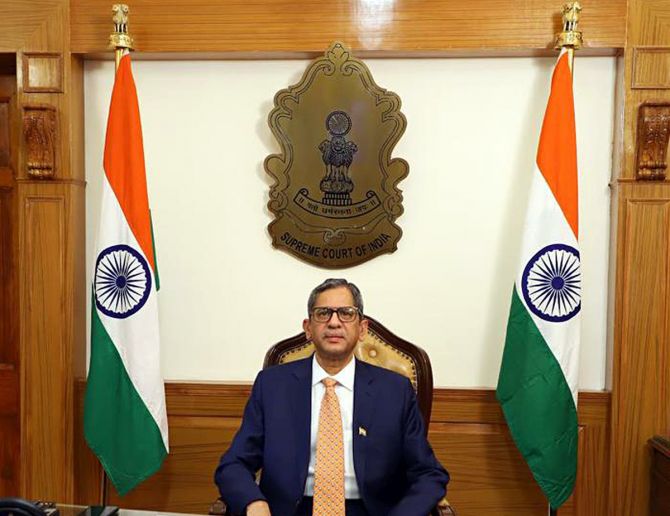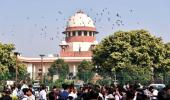The process of appointment of judges is ”sacrosanct” and the media must recognise its sanctity, Chief Justice of India (CJI) N V Ramana said on Wednesday while expressing anguish and terming "very unfortunate" certain speculative news reports about the collegium meeting.

Stating he is ”extremely upset” about reports in the media regarding the appointment of judges in the Supreme Court, the CJI observed that career progression of bright talents has been marred earlier by "irresponsible reporting".
He said he expects all the stakeholders to uphold the integrity and dignity of this institution.
The CJI, while heading a ceremonial bench to bid farewell to Justice Navin Sinha who is retiring on Wednesday, said today's reflections in some sections of the media pending the process even before formalising the resolution is counter-productive.
”On this occasion I want to take the liberty to express my concern about certain speculations and reports in the media. You are all aware we need to appoint judges to this court. The process is ongoing. Meetings will be held and decisions will be taken.
"The process of appointment of judges is sacrosanct and has certain dignity attached to it. My media friends must understand and recognise the sanctity of this process,” CJI Ramana said.
As an institution, the apex court holds the freedom of media and the rights of individuals in high esteem, he said.
”There were instances of deserving career progression of bright talents getting marred because of such irresponsible reporting and speculation. This is very unfortunate and I am extremely upset about it,” he said.
The CJI also lauded the ”tremendous amount of maturity and responsibility” displayed by a majority of senior journalists and media houses in showing restraint and not speculating on such a serious matter.
”Such professional journalists and ethical media are the real strength of the Supreme Court in particular and democracy in general. You are part of our system. I expect all the stakeholders to uphold the integrity and dignity of this institution,” he said, adding, ”I am sure brother Sinha will forgive for deviating a bit on this solemn occasion. He will understand my anguish.”
The head of the judiciary was referring to media reports which said the collegium, headed by the CJI, is understood to have recommended nine names for appointment as judges in the top court.
The CJI said Justice Sinha, who was elevated as an apex court judge on February 17, 2017, is known by the bar and bench for his straight-forward and candid approach and he will always be remembered as a fair judge, ”one who talks less but is very insightful”.
He said during his tenure as an apex court judge, Justice Sinha has been party to many important verdict and he himself has penned 114 judgments on diverse topics including intellectual property rights, criminal law and many more.
”He has disposed of over 13,671 cases in this court,” the CJI said, adding that Justice Sinha's knowledge and wisdom are writ large in all his judgments.
”Personally, I am left feeling quite saddened by his retirement. We are losing an important voice and a valued colleague,” the CJI said.
He said the qualities he most admires in Justice Sinha are his humility, simplicity and he never makes anyone feel less or unworthy.
He said Justice Sinha's forward thinking was clear from the fact that he championed the computerisation of records in all the three high courts -- Patna, Chhattisgarh and Rajasthan -- where he was a judge before being elevated to the apex court.
The CJI, who said he firmly believe that the nation will continue to draw benefit of Justice Sinha's rich experience, wished him all the best for his future endeavours on behalf of all the judges.
Speaking on the occasion, Justice Sinha thanked the CJI and the advocates including those who spoke about him before the ceremonial bench.
Solicitor General Tushar Mehta, while referring to Justice Sinha's retirement, said today is a ”very sad day” for the legal fraternity.
”We will always miss you,” Mehta said.
Senior advocates Vikas Singh, who is also the president of the Supreme Court Bar Association, and several other lawyers, including former Solicitor General Ranjit Kumar, also spoke during the occasion.
Born on August 19, 1956, Justice Sinha was enrolled as an advocate in 1979 after completing his law degree from the University of Delhi.
He practised before the Patna high court for 23 years and was appointed as a permanent judge there on February 11, 2004.
He was the Chief Justice of high courts of Chhattisgarh and Rajasthan before being elevated as a judge of the apex court.
In the apex court, he was part of several important judgments including the landmark verdict in January 2019 upholding the constitutional validity of the Insolvency and Bankruptcy Code in its entirety.












 © 2025
© 2025